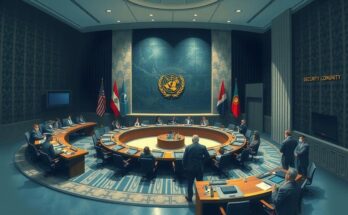Cardinal Ameyu of Juba expressed hope for lasting peace in South Sudan following the government’s decision to extend the transitional period by two years, postponing elections. He emphasized the importance of preparation for future polls, addressing ongoing violence and economic hardships, and commended recent peace initiatives and the positive influence of Pope Francis’s visit on community cohesion.
Cardinal Ameyu of Juba expressed optimism for enduring peace in South Sudan despite the recent extension of the transitional period by two years, which followed the government’s decision to postpone national elections originally scheduled for December 2024. The Cardinal emphasized the church’s role in encouraging political parties to prepare diligently for future elections, highlighting the necessity for a free and peaceful voting environment. The backdrop to this situation includes the pressing need for a national census and the establishment of a permanent constitution, as outlined by President Salva Kiir’s administration. The political landscape continues to be fragile, as South Sudan grapples with the repercussions of a brutal civil war that claimed over 400,000 lives between 2013 and 2018, leading to widespread displacement and ongoing intercommunal violence. Cardinal Ameyu noted the daunting economic and social difficulties exacerbating the unrest, as nearly 76 percent of the population requires humanitarian assistance, prompting some youth to engage in criminal activities due to desperation. Despite these challenges, the Cardinal commended the efforts of the Tumaini Peace Initiative launched in May 2024, which aims to mediate between rebel factions and work towards sustainable peace. He remarked on the positive influence of Pope Francis’s peace pilgrimage to South Sudan earlier this year, indicating that it has fostered spiritual growth within the community and contributed to a reduction in violence. The Cardinal reported that, as a result of the Pope’s visit, church attendance has increased, with nearly 3,000 children receiving the Sacrament of Confirmation recently. In his observation, the Cardinal concluded that the joint efforts of religious leaders and the ongoing dialogue amongst political factions will be crucial in navigating South Sudan towards a more stable and peaceful future. He emphasized the Church’s ongoing commitment to fostering peace through outreach and prayer, ultimately encouraging optimism for lasting reconciliation within the nation.
South Sudan has been mired in conflict since its independence in 2011, with a civil war breaking out in 2013. The situation has required various agreements and initiatives, including the 2018 Revitalized Agreement on the Resolution of the Conflict in South Sudan, aimed at promoting peace. However, challenges persist, such as the need for a national census, economic instability, and ongoing violence exacerbated by the proliferation of arms. The role of the Church, alongside international efforts—including those from Pope Francis—has been pivotal in advocating for peace and unity among various factions within the country.
In summary, Cardinal Ameyu has expressed hope for the future of South Sudan, pointing to the critical need for well-prepared elections and the importance of addressing social and economic challenges. The success of the Tumaini Peace Initiative, along with the positive impact of Pope Francis’s visit, offers a glimmer of hope for peace in the region. The engagement of religious leaders and the commitment to dialogue remain essential for achieving lasting reconciliation and stability.
Original Source: www.vaticannews.va




